
Interpreting Chinese trade moves and understanding their links to policy and politics is not quite as easy as it looks. That is certainly true of these latest restrictions on Australian coal exports to China.
Nonetheless, there is no doubt that Beijing is extremely grumpy with Canberra at the moment.
But everything that Canberra has done that annoys Beijing has been forced on it by Chinese actions that contradict Australia’s national interests.
Any Australian government would have to act to protect our critical infrastructure from foreign investment that could compromise its security. Any Australian government would want to prevent foreign interference in our politics. Any Australian government with half a thimbleful of strategic nous would be determined to remain the strategic, aid and commerce partner of choice in the South Pacific.
And any Australian government would object to compromising cyber intrusions. Even if it is not absolutely clear, or at least certainly not yet publicly confirmed, that the Chinese were behind the latest cyber intrusions against our political parties, the Australian government, on the basis of clear judgments from our intelligence agencies, has named Beijing as the author of numerous previous intrusions.
Beijing objects to the Australian government protecting its national interests.
It has used trade retaliation to express political displeasure against many other trading partners, among them South Korea, Japan and Britain.
If these coal restrictions are politically motivated, we are not Robinson Crusoe.
Scott Morrison has got it right in saying in the past that we seek the closest possible engagement and positive relationship with Beijing but we will never compromise our own national interests.
Both halves of that statement are true and compelling, and a conscientious government has to attend to both of them all the time.
Nonetheless our coal exports are a vital income earner for Australia. They underlie our national prosperity.
It is utter nonsense to suggest that the demand for either coking coal or thermal coal has collapsed. Commodity prices go up and down for many different reasons. But we know for sure that there are many new coal-fired power stations being built in different parts of the world. And they are not going to run on air.
So coal remains critically important to our standard of living.
It is also the case that Chinese politically motivated trade actions against other nations in the recent past have tended to be relatively short-lived. Beijing does these things to make a point. It seldom damages its own situation in the long term by destroying mutually beneficial trading relationships.
Mind you, geo-strategic manoeuvring by great powers is not the common law, it is not bound by precedent. There are no guarantees.
Here is one final, hugely important reflection.
Australian policy towards China is chiefly discussed by the strategic community and by the business community. They frequently speak at cross purposes and seldom talk meaningfully to each other.
But for years now, the strategic community has been trying to tell the business community a hard and unwelcome truth. Over-reliance on a single market sets up an uncomfortable, perhaps unacceptable, level of vulnerability.
Whoever is elected in May should address that national vulnerability as a matter of urgency.





To join the conversation, please log in. Don't have an account? Register
Join the conversation, you are commenting as Logout